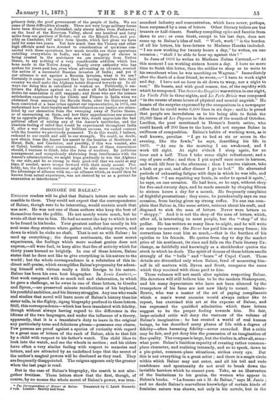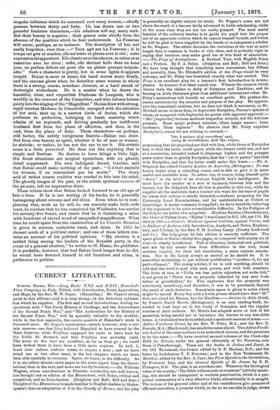HO:SIORE DE BALZAC.* ENGLISH readers will be glad that Balzac's
letters are made ac- cessible to them. They could not expect that the correspondence of Balzac, though sure to be interesting, would contain much that was new. He was not one of those authors who keep the best of themselves from the public. He not merely wrote much, but he wrote all that was in him. He had no secret the key to which is not to be found in his books. Your greatest author has usually in his soul some deep stratum where gather cool, refreshing waters, and down to which he sinks no shaft. That is not so with Balzac ; he used up everything ; the deepest sentiments, the most secret experiences, the feelings which more modest genius does not express,—all were fuel, to keep alive that fire of activity which for thirty years burned so brightly. In one of these letters, Balzac states that he does not like to give everything in his nature to the world ; but the whole correspondence is a refutation of this in- direct self-praise, which exemplifies Balzac's propensity for adorn- ing himself with virtues really a little foreign to his nature. Balzac has been his own best biographer. In Louis Lambert,— that work composed with so much toil and elaboration, in which he gave a challenge, as he owns in one of these letters, to Goethe and Byron,—are preserved minute recollections of his boyhood, his youthful ambition, and his literary. struggles. Any one who reads and studies that novel will learn more of Balzac's history than his sister tells, in the flighty, zigzag biography prefixed to these letters. Still, this correspondence—which has been translated with fidelity, though without always having regard to the difference in the idioms of the two languages, and under the influence of a theory, apparently, that it is a translator's duty to leave in the original any particularly terse and felicitous phrase—possesses one charm. Few persons are proof against a species of curiosity with regard to a great man of letters of the rank of Balzac, akin to that felt by a child with respect to his father's watch. The child likes to look into the watch, and see the wheels in motion ; and his elders have often a very similar feeling with respect to memoirs and letters, and are attracted by an undefined hope that the secret of the author's magical powers will be disclosed as they read. They are frequently disappointed. The enigma appears only the greater when the last page is read.
But in the case of Balzac's biography, the search is not alto- gether fruitless. These letters show that the first, though, of course, by no means the whole secret of Balzac's power, was tran-
The Correspondence of Honore de &lure. Translated by C. Lamb Kennedy. 2 vole. London: Bentley and Sons.
scendent industry and concentration, which have never, perhaps, been surpassed by a man of letters. Other literary toilers are but truants or half-timers. Southey compiling epics and facetite from dawn to eve ; or even Scott, except in his last days, does not come up to Balzac's idea of toil. " Work, work ! " is the burden of all his letters, his love-letters to Madame Henske included. " I am now working for twenty hours a day," he writes, on one occasion ; " shall I be able to bear up against this ? "
In June of 1836 he writes to Madame Zulma Carraud,—" At this moment I am working sixteen hours a day. I have no more time to finish this letter, than the soldier to sleep or to write to his sweetheart when he was marching on Wagram." Immediately after the death of a dear friend, he wrote,—" I have to work night and day. I have not an hour to sit down to weep, nor a night to rest." He boasts, and with good reason, too, of the rapidity with which be composed. The Secret des Ruggieri was written in one night, La Vieille Fille in three nights, and La Perle Brisie was composed "in the course of some hours of physical and mental anguish." He boasts of the surprise expressed by the compositors in a newspaper office that he could write 6,000 lines in six days ; and he is proud that people are incredulous as to his being able to finish the 20,000 lines of Les Paysans in the course of the month of October. Lucilius, the poet mentioned in Horace's fourth satire, who could knock off 200 lines to the hour, did not surpass Balzac in swiftness of composition. Balzac's habits of working were, as is well known, peculiar. " I go to bed at six or seven in the evening, like the fowls," he says, describing his life in 1833. " At one in the morning I am awakened, and I work till eight. At eight o'clock I sleep again, for an hour and a half. Then I take some slight refreshment, and a cup of pure coffee ; and then I put myself once more in harness, and work till four in the afternoon ; then 1 receive visitors, take a bath or go out, and after dinner I go to bed." He alternated periods of exhausting fatigue with days in which he was idle, and lay fallow. "I am repairing my brain, in order to spend it again,' he says, on one occasion. He had been, so he says, without sleep for five-and-twenty days, and he made amends by sleeping fifteen to sixteen hours a day for a month. He frequently complains of frightful prostrations ; they come, he paradoxically says on one occasion, from having given up strong coffee. No one can com- plain that Balzac is, like some artists, reticent about his craft, and disposed to sink the man of letters. Never were letters so " shoppy." And it is not the shop of the man of letters, which, after all, is interesting to most people, but the "shop" of the pedlar. He has written so many lines to-night, and he will write so many to-morrow ; the Revue has paid him so many francs; his corrections have cost him so much,—that is the burthen of his epistles to his friends. He quotes from day to day the market price of his sentiment, its rises and falls on the Paris literary Ex- change, as faithfully and knowingly as a stockbroker quotes the stock in which he deals. The spirit of dozens of these letters smells strongly of the " bulls " and " bears " of Capel Court. These details are diversified only when Balzac, fond of measuring him- self in all matters with Byron and Scott, compares the sums which they received with those paid to him.
These volumes will not much alter opinion respecting Balzac. His devotees will still believe him to be the modern Shakespeare, and his many depreciators who have not been- silenced by the trumpeters of his fame are not now likely to recant. Sainte- Beuve, who was a master of the art of paying compliments which a man's worst enemies would always rather like to repeat, has exercised this art at the expense of Balzac, and has expressed the qualified admiration which these letters suggest to be the proper feeling towards him. No fair, large-minded critic will deny the vastness of the volume of Balzac's imagination ; be has created a world of real human beings, he has described many phases of life with a degree of fidelity—often harassing fidelity—never exceeded. But a critic may be fair, and yet deny him the possession of an imagination of fine quality. The compass is large, but the timbre is, after all, some- what poor. Balzac's limitless capacity of creating rather common- place character, and realising intensely, and so to speak, down to a pin-point, common-place situations, strikes every eye. But this is not everything in a great artist ; and there is a magic circle within which Balzac may not enter, and all his toil and rude confidence and spontaneity do not avail to break down the invisible barriers which he cannot pass. Take, as an illustration of the limitations to his genius, the women who appear in Balzac's books. " La femme eat is M. de Balzac," says M. Janin ; and no doubt Balzac's marvellous knowledge of certain kinds of feminine nature was shown, not only in his novels, but in the singular influence which be exercised over many women,—chiefly persons between thirty and forty. Ile has drawn one or two graceful feminine characters,—his admirers will say, many such. But their beauty is negative ; their graces arise chiefly from the absence of the qualities which he best understands. La Fosseuse will occur, perhaps, as an instance. The description of her, not easily forgotten, runs thus :—" Tout agit stir La Fosseuse ; si le temps est grin et sombre, elle est triste et pleure avec le ciel ; cette expression lui appartient. Elle chante avec les oiseaux, se calme et se rasserene avec les (deux ; enfin, elle devient belle dans un beau Jour, un parfum &Heat eat pour elle un plaisir presque inepuis- able." Such a character is pretty, but in some lights it appears insipid. Balzac is more at home, his hand moves more firmly, and the canvass glows when he describes some woman in whom there is a strong, coarse, mundane element, or a hard streak of downright wickedness. He is a master when he draws the beautiful, clear, and coquettish Duchease de Langeais, who is worldly in the convent of the Carmelites, and who infuses human gaie ty into the singing of the "Magnificat." He can draw with strong, rapid touches Madame de Grandville, occupied with the salvation of her soul, shut up in a narrow circle of duties, which she performs to perfection, indulging in harsh austerity which admits of no reproach, and driving gradually her indifferent husband first from the plane of affection, and then, in the end, from the plane of duty. These characters—or perhaps, still better, the subtly voluptuous Beatrix—Balzac can draw. But from true beauty or spirit, whether it be of man or woman, be shrinks ; or rather, he has not the eye to see it. His artistic sense is a little perverted. He does not like anything that is simple and flawless. He desires to have things a little high. His finest situations are surgical operations, with no ghastly detail suppressed. His own indulgent friend, Gautier, said that Balzac could make nothing of the past ; " it s'etait assimile les vivants, it ne ressuscitait pas lea snorts." The sharp acid of rather coarse realities was needed to bite into his mind. The ghostly images of the past, or the subtle spiritual nuances of the present, left no impression there.
These letters show that Balzac looked forward to an old age of bric-h-brac. If he is not writing of his books, he is generally haranguing about screens and old china. Even when he is com- plaining that, work as be will, be can scarcely-make both ends meet, he rejoices that he has completed his Wiesbaden tea-service for seventy-five francs, and states that he is furnishing a salon with furniture of carved wood of unequalled magnificence. What time he could spare from the construction of La Com6rdie Hnmaine is given to screens, malachite vases, and china. In 1832 he dreamt much of a political career ; and one of these letters con- tains an account of his political opinions. " My election is a settled thing among the leaders of the Royalist party, in the event of a general election," he writes to M. Mame, the publisher. It is probable, however, that had Balzac lived longer than he did, be would have devoted himself to old furniture and china, in preference to politics.







































 Previous page
Previous page